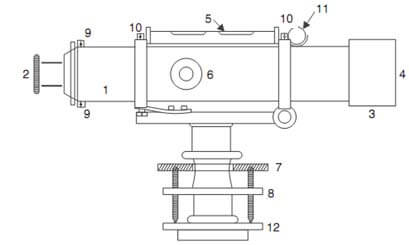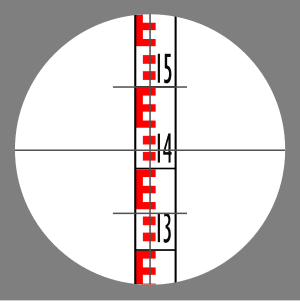Surveying is a very important part of civil engineering. Knowledge of surveying is incomplete without the knowledge of leveling. The dumpy level is a commonly used leveling instrument. To be acquainted with this leveling instrument and learn how to operate it one should read the following article carefully.
What is Dumpy Level?
The dumpy level is an optical surveying leveling instrument consisting a telescope tube firmly secured in two collars fixed by adjusting screws to the stage by the vertical spindle.
The telescope of dumpy level can rotate only in a horizontal plane. Relative elevation of different points of a surveying land is determined with dumpy level.
English civil engineer William Gravatt is considered as the inventor of the dumpy level. He invented dumpy level in 1832 while using the conventional Y level.
A dumpy level is also called a builder's level, an automatic level.

Use of Dumpy Levels in Surveying
The dumpy level is mainly used in surveying for the following purposes:
- To determine relative height and distance among different locations of a surveying land.
- To determine relative distance among different locations of a surveying land.
Advantages of Dumpy Level Survey
The dumpy level is a widely used surveying instrument in surveying. The advantages which have made the dumpy level so popular is given below.
- Simple construction with fewer movable parts.
- Fewer adjustments to be made.
- Due to the rigidity of dumpy levels, it retains its two adjustment for a long time.
- High optical power.
Disadvantages of Dumpy Level Survey
There are few limitation or disadvantages of dumpy level. These limitations are given below.
- Civil Engineers may find it difficult in making accurate measurements.
- Difficulty in using.
Parts of Dumpy Levels

Following are the main parts of dumpy level instrument.
|
|
How to Use a Dumpy Level for Surveying
To conduct dumpy level survey the following instruments is required.
- Dumpy Level
- Tripod
- E meter staff or English staffs
Also, an assistant will be required for a dumpy level survey. Once everything is ready, the following steps should be followed for a successful dumpy level survey.
- At first, the tripod is configured properly to hold the dumpy level. The tripod height should be adjusted until it is on the eye level. Then, legs of the tripod should be moved to a balanced position to hold the instrument properly. Finally, tripod legs should be fixed by pressing them to the ground.
- The dumpy level instrument is set up on the top of the tripod. Foot screw is used to screw the device tightly on the tripod. As the level head is very sensitive, special care is required in this step.
- To work properly, it is very important to make the dumpy level completely horizontal. Using foot-screws (leveling screws) the dumpy level is set to a leveled condition. Leveling screws should be adjusted until the alignment bubble is in the center of the marker.
- The operator looks through the eyepiece of the telescope.
- An assistant holds an E meter or staff vertical at the point under measurement. Usually, this staff has both imperial and metric measurements. The 'E' on the staff is equivalent to five centimeters.
- The elevations (levels) of different points is gathered with the help of the instrument and staff.
- Measurement generally starts from a benchmark with the known height determined by a previous survey, or an arbitrary point with an assumed height.

Related questions that you can answer after reading the above article:
- What is a dumpy level?
- What is the definition of dumpy level?
- how to use a dumpy level?
- how to use dumpy level
- what is dumpy level?
- What are the dumpy level instruments?
- how to use a dumpy level instrument?
Tag: dumpy level procedure, dumpy leveling, dumpie level, dumpy level parts description, dumpy level surveying
Related Articles:
- Dumpy Level Set-up and Use Tutorial
- Dumpy Level Survey Tutorial- Staff Reading
- How to Use Dumpy Level- Tutorial With Example

